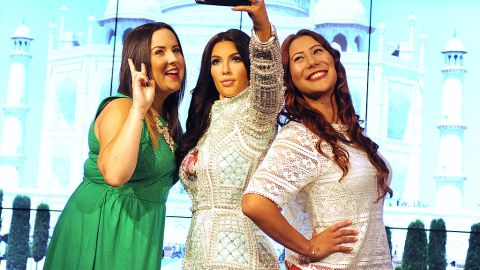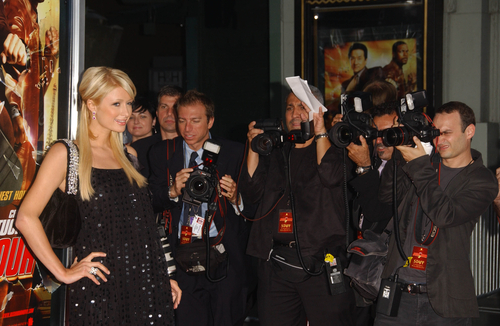Do We Worship Celebrities Like Religious Figures?

The fact Robert Ritchie is considering a Senate run on the Republican ticket would likely not make much news this far out from an election. Born in Romeo, Michigan, to a successful car dealing father, he grew up on an estate and eventually fell in love with breakdancing in the early eighties. He would likely remain inconsequential to public eye had not hip-hop producer D Nice given him a shot while opening for the famed Boogie Down Production a few years later.
Kid Rock signed his first recording contract at seventeen, much to parental chagrin. Long before Eminem made Motor City his own, Rock’s 1990 debut put Detroit hip-hop—well, his take on it—on the map. Through ups and downs his fame has persisted to this day. So when he says he’s exploring national politics, the Internet lights up with nods of approval and howls of derision.
Whatever you think of Kid Rock’s music, he will certainly garner attention should he officially enter the race. And your feelings on his politics will only be exaggerated in either direction given his profile. That is the power of celebrity.
But how does one acquire this vaunted mantle of fame? First, there are levels of celebrity. I know nothing about famous magicians (save the very biggest) because it’s not a genre of entertainment I pay attention to. I do know top Malian musicians, however, as that’s one of my favorite musical regions on the planet. Vieux Farka Touré, Oumou Sangaré, and Bassekou Kouyate capture my attention whereas many Americans gloss over the names.
And then there are celebrities, people the masses not only know but worship. That’s a word Columba Law Professor Tim Wu, who coined the term ‘net neutrality’ back in 2003, finds odd in regards to our fascination with celebrities. In his latest book, The Attention Merchants, Wu devotes a chapter to the trend of treating celebrities like deities. As he told Big Think earlier this year, our devotion is a specific kind:
If they’re gods, they’re more like the Greek gods: they’re prone to embarrassing drunken incidents, they say outlandish things, but somehow people just can’t stand to look away from celebrities.
In his book Wu points to Time magazine’s decision to pick a “Man of the Year,” as well as featuring a notable individual on the cover each week, that helped kickstart the cult of personality we now imbue celebrities with. A harbinger of the Internet age, when Time launched in 1923 it was more blog than newspaper, featuring a hundred short articles each week, none more than four hundred words in length.
But it wasn’t until the same publisher launched People in March, 1974, with Mia Farrow on its cover, that celebrity worship really took form. That is when Wu believes we started seeing a unique change in what being a celebrity entails. Worshipped humans probably predate city-states; tribes likely featured alpha males and wise grandmothers. What was new was celebrities become industries simply from brand recognition; what was new was individuals becoming brands.
Particular to modernity is not the existence of famous individuals but rather the idea of constructing an industry based on the demand for feeling some communion with them, on our willingness to idolize them (literally)—an industry that monetizes their capacity to capture our rapt attention.
During his Big Think video Wu mentions his 2014 run for the Democratic nomination as New York’s Lieutenant Governor, which he lost to Kathy Hochul. He noticed that whenever he discussed serious issues the press barely noticed. But when actor Mark Ruffalo endorsed his candidacy everyone’s ears perked up.
Since People launched Wu traces a “celebrification” of the mainstream, which now seems entirely commonplace, given the fact Americans voted a reality television star President. The question is: Why? Why do we worship people we don’t even necessarily care for? Loving someone’s art is one thing; spotting an actor you only know as famous then posting a blurry photo of them passing an airplane row is another spectacle entirely, one many people enjoy and take some pride in. Their identity even feels more gratified by it, as if simply by being in a celebrity’s space their own status has been raised.
While Wu admits he has no big revelation on the “why,” he does point to it being rooted in a wish for a “transcendence of the normal,” which is where the religious affiliation steps in: venerated humans are objects of transference. But now, with the rise of camera phones making everyone a potential star, veneration no longer matters. As cameras often rely on illusions—tricks of lighting, angles, stylization—certain characters give off the appearance of veneration with none of the hard-won discipline of character development.
Brooklyn-based yoga teacher J Brown addresses the issue in a blog post on the celebrification of yoga instructors. For context, Richard Freeman began practicing yoga in 1968 and is largely responsible for bringing the practice into American culture.
Those with a deep passion for studying yoga, who have observed the trends with a degree of dismay, find it profoundly difficult to appreciate how it has come to pass that Rachel Brathen, aka Yogagirl, can leverage her millions of Instagram followers and bring hundreds to an event but Richard Freeman, perhaps one of the foremost teachers on the planet, only has thirteen people sign up for an appearance at a Yoga Journal NYC conference.
The pop-psychology yoga shtick Instalebrity yogis espouse is nothing like the serious discipline Freeman has taken great care in transmitting during his half-century of studentship. Then again, a serious student of Freeman’s lineage wouldn’t feel a compulsion to obsessively post photos of themselves. That’s what celebrity is for, not meditation and contemplation.
Which is, in many ways, a point Wu concedes when we transfer our attention to others in such a manner. He believes the “relating” to religious figures has the same neurological basis as our current worship of celebrities. The problem in yoga and meditative arts is that the teacher’s role is to help the student fully realize themselves, not create clones or, as is often the case in celebrity worship, monetize the fans at every turn.
Which is what happens when Instagram yogis include sponsor links and discount codes or Kardashians create video games and fashion lines—or television stars run for national government. Our money follows our attention. There’s a vast distance between supporting an artist or thinker you love and believe in and being conned by people whose sole interest is exploiting their brand, a term now interchangeable with identity. So long as celebrity worship continues, this will be the case.
—
Derek is the author of Whole Motion: Training Your Brain and Body For Optimal Health. Based in Los Angeles he is working on a new book about spiritual consumerism. Stay in touch on Facebook and Twitter.





